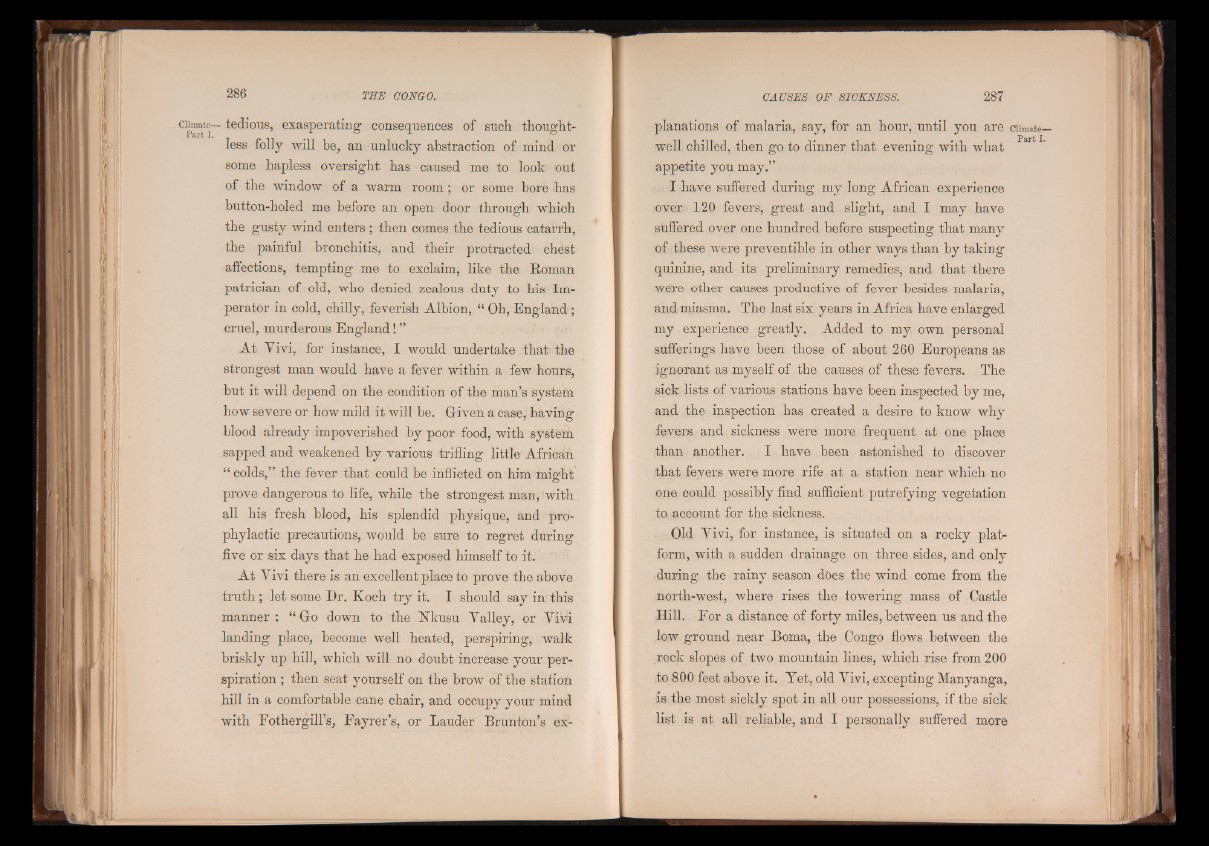
— tedious, exasperating consequences of such thoughtless
folly will be, an unlucky abstraction of mind or
some hapless oversight has caused me to look out
of the window of a warm room; or some bore has
button-holed me before an open door through which
the gusty wind enters ; then comes the tedious catarrh,
the painful bronchitis, and their protracted chest
affections, tempting me to exclaim, like the Roman
patrician of old, who denied zealous duty to his Im-
perator in cold, chilly, feverish Albion, “ Oh, England ;
cruel, murderous England! ”
At Yivi, for instance, I would undertake that the
strongest man would have a fever within a few hours,
but it will depend on the condition of the man’s system
how severe or how mild it will be. Given a case, having
blood already impoverished by poor food, with system
sapped and weakened by various trifling little African
“ colds,” the fever that could be inflicted on him might
prove dangerous to life, while the strongest man, with
all his fresh blood, his splendid physique, and prophylactic
precautions, would be sure to regret during
five or six days that he had exposed himself to it.
At Yivi there is an excellent place to prove the above
truth ; let some Dr. Koch try it. I should say in this
manner: “ Go down to the Nkusu Yalley, or Yivi
landing place, become well heated, perspiring, walk
briskly up hill, which will no doubt increase your perspiration
; then seat yourself on the brow of the station
hill in a comfortable cane chair, and occupy your mind
with Fothergill’s, Fayrer’s, or Lauder Brunton’s explanations
of malaria, say, for an hour, until you are climate-
• Part J well chilled, then go to dinner that evening with what
appetite you may.”
I have suffered during my long African experience
over 120 fevers, great and slight, and I may have
suffered over one hundred before suspecting that many
of these were preventible in other ways than by taking
quinine, and its preliminary remedies, and that there
were other causes productive of fever besides malaria,
and miasma. The last six years in Africa have enlarged
my experience greatly. Added to my own personal
sufferings have been those of about 260 Europeans as
ignorant as myself of the causes of these fevers. The
sick lists of various stations have been inspected by me,
and the inspection has created a desire to know why
fevers and sickness were more frequent at one place
than another. I have been astonished to discover
that fevers were more rife at a station near which no
one could possibly find sufficient putrefying vegetation
to account for the sickness.
Old Yivi, for instance, is situated on a rocky platform,
with a sudden drainage on three sides, and only
during the rainy season dbes the wind come from the
north-west, where rises the towering mass of Castle
Hill. For a distance of forty miles, between us and the
low ground near Boma, the Congo flows between the
reck slopes of two mountain lines, which rise from 200
to 800 feet above it. Yet, old Yivi, excepting Manyanga,
is the most sickly spot in all our possessions, if the sick
list is at all reliable, and I personally suffered more